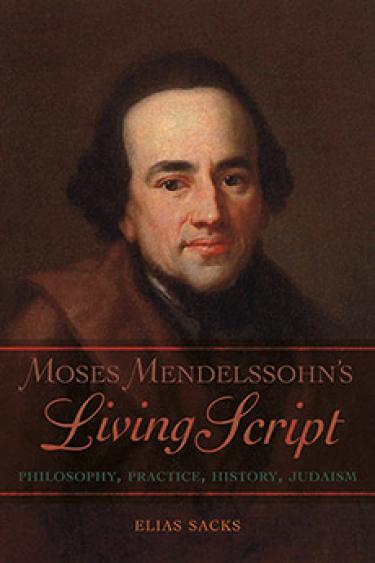 About the book: Moses Mendelssohn (1729–1786) is often described as the founder of modern Jewish thought and as a leading philosopher of the late Enlightenment. One of Mendelssohn's main concerns was how to conceive of the relationship between Judaism, philosophy, and the civic life of a modern state. Elias Sacks explores Mendelssohn's landmark account of Jewish practice—Judaism's "living script," to use his famous phrase—to present a broader reading of Mendelssohn's writings and extend inquiry into conversations about modernity and religion. By studying Mendelssohn's thought in these dimensions, Sacks suggests that he shows a deep concern with history. Sacks affords a view of a foundational moment in Jewish modernity and forwards new ways of thinking about ritual practice, the development of traditions, and the role of religion in society.
About the book: Moses Mendelssohn (1729–1786) is often described as the founder of modern Jewish thought and as a leading philosopher of the late Enlightenment. One of Mendelssohn's main concerns was how to conceive of the relationship between Judaism, philosophy, and the civic life of a modern state. Elias Sacks explores Mendelssohn's landmark account of Jewish practice—Judaism's "living script," to use his famous phrase—to present a broader reading of Mendelssohn's writings and extend inquiry into conversations about modernity and religion. By studying Mendelssohn's thought in these dimensions, Sacks suggests that he shows a deep concern with history. Sacks affords a view of a foundational moment in Jewish modernity and forwards new ways of thinking about ritual practice, the development of traditions, and the role of religion in society.
About the author: Elias Sacks is Assistant Professor of Religious Studies and Jewish Studies at the University of Colorado Boulder.
Reviews: "Scholars will take issue with this or that in Sacks's arguments, but they will not be able to ignore his work. It forces a rethinking of Mendelssohn's thought at a time when attention is again being focused on this Jewish thinker. Sacks's middle ground on Mendelssohn's traditionalism or radicalism seems to me a persuasive one and will, I believe, win broad, if not complete acceptance."
—Michael A. Meyer, author of Judaism within Modernity
"Elias Sacks's suggestion that Mendelssohn is philosophically motivated by the threat of historical consciousness to traditional Judaism is novel. A fresh, important, and exciting argument for the continued relevance of this founder of modern Jewish thought."
—Paul E. Nahme, Brown University


